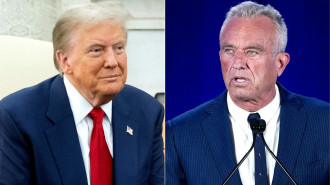US says "credible" that Eritrea involved in Ethiopia's Tigray conflict
The United States said Friday it believed Eritrean forces had entered Ethiopia's Tigray region after a military offensive by Prime Minister Abiy Ahmed against the dissident ruling party in the country's north.
Abiy on November 4 ordered the federal army to confront forces loyal to the Tigray People's Liberation Front (TPLF), sparking a cross-border humanitarian crisis and fears the wider region could be dragged into the conflict.
The US had earlier applauded Eritrea, a secretive country to Ethiopia's north, for exercising restraint after rockets fired from Tigray struck its capital city, but said new information indicated their presence in the fighting.
"We are aware of credible reports of Eritrean military involvement in Tigray and view this as a grave development," a State Department spokesperson said.
"We urge that any such troops be withdrawn immediately."
The TPLF dominated Ethiopian politics for nearly three decades and fought a brutal 1998-2000 border war with Eritrea that left tens of thousands dead. Abiy came to power in 2018 and won the Nobel Peace Prize the following year in large part for his effort to initiate a rapprochement with Eritrea.
Ethiopia has repeatedly denied Eritrean involvement in the conflict, which Abiy declared over on November 28 when he said the army captured the regional capital Mekele without inflicting any civilian casualties.
Read also: UN says Sudan needs $150 million to help Ethiopian refugees
Aid standoff
The United Nations and aid agencies have been unable to access Tigray since the start of fighting and are deeply worried over the plight of civilians and refugees -- as well as their own staff on the ground -- and have called for unfettered access.
An agreement last week to allow the UN and aid agencies access to Tigray foundered, deepening international alarm.
Ethiopia has bridled at suggestions that outsiders might play a leading role in providing humanitarian assistance and Abiy said Friday his government would be in charge of what aid was delivered and where.
"The delivery of assistance lies within a coordination framework under the federal government's overall authority," he said.
Twitter Post
|
Any suggestion his government was not committed to aid delivery was part of a "misinformation campaign", he added, listing truckloads of food and medicine he said was being sent to Tigray.
The government has repeatedly insisted that its "rule of law operations" in Tigray are aimed solely at the TPLF leadership, not Tigrayan civilians.
Nevertheless, thousands have been killed since fighting began, according to the International Crisis Group think tank, and around 50,000 people have fled to refugee camps across the border in Sudan.
This week, the UN rights chief Michelle Bachelet said the conflict was having an "appalling impact on civilians," including multiple reports of ethnic massacres and ethnic targeting.
Announcing a fresh agreement with Ethiopia on humanitarian access on Wednesday, UN Secretary General Antonio Guterres promised the deal will "make sure that there is full access to the whole of the territory, but emphasised that this must happen "without any kind of discrimination."
Risky assistance
In a sign of the depth of tensions over where and how aid agencies should operate in Tigray, a UN team was shot at by Ethiopian forces on Sunday and briefly detained, a government spokesman said this week.
He said the team ignored instructions and drove through checkpoints before being fired on, and blamed them for the incident, saying they had embarked on "a kind of adventurous expedition".
The risks faced by international aid agencies were underscored on Friday when the Danish Refugee Council confirmed the deaths of three of its security guards last month, and the International Rescue Committee (IRC) said one staff member had been killed.
Despite last month's victory declaration, the UN and aid agencies have said fighting continues -- reports Abiy dismissed as "untrue" and unhelpful as the army works to stabilise what he called an "insecure environment".
He said "sporadic gunfire exchanged with the retreating remnants" of TPLF forces "need not be misconstrued as active conflict".
A government communications blackout combined with tight restrictions on access to Tigray has made it impossible to independently verify claims regarding the nature of any ongoing fighting, or the true impact of the humanitarian situation on the ground.
An estimated 600,000 people in Tigray were dependent on food aid before the fighting began, including 96,000 refugees from neighbouring Eritrea.
The UN humanitarian agency OCHA said Friday that food rations for displaced people in Tigray had "run out" and "people in need are still not able to access any assistance."
Ethiopia, meanwhile, said Friday it was returning "misinformed" Eritrean refugees making their way south to Addis Ababa back to the camps in Tigray, where they can receive aid and live "lawfully and peacefully".







 Follow the Middle East's top stories in English at The New Arab on Google News
Follow the Middle East's top stories in English at The New Arab on Google News
![The new film casts Israeli actors to tell the story of Mary while leaving out Palestinians [Getty]](/sites/default/files/styles/image_330x185/public/2024-11/GettyImages-2172155541.jpg?h=199d8c1f&itok=wJWyXDEQ)
![Ben & Jerry's has taken Unilever to court for its alleged attempts to silence it [Getty]](/sites/default/files/styles/image_330x185/public/2024-11/GettyImages-2183900214.jpg?h=199d8c1f&itok=jEcYtQ64)
